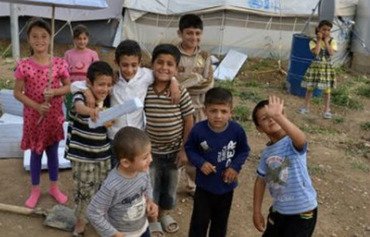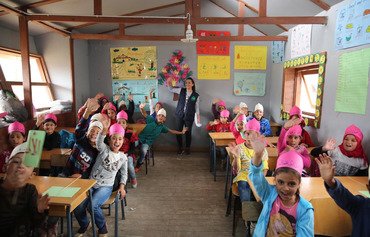At the Bar Elias Public Primary School in Lebanon's Bekaa Valley, hundreds of Syrian refugee children receive formal education thanks to programmes implemented by donor organisations and the Lebanese state.
More than 850 Syrian refugee students are enrolled in the afternoon sessions and 500 others in the morning sessions.
From behind a glass window, Syrian refugee Samar Jumrak watched as her 7-year-old daughter Raghad was engaged in her mathematics class at the Bar Elias school.
She smiled with satisfaction and clapped when her daughter gave a correct answer.
Jumrok told Al-Mashareq she watches from behind the glass window because "I am very interested in keeping abreast of how my three children are doing in class".
"I also follow up on their performance at school at the periodic parents' committee meetings," she said.
Education 'our main concern'
Many Syrian parents like Jumrok come to the school every week for parent meetings and to follow up on their children's education.
"Education for our three children has been our main concern since our displacement from al-Qusayr six years ago," she said.
"My husband and I immediately set out to look for a suitable school because we wanted them to get an education, even if at the expense of food and clothing," Jumrok said.
"We were unable to enroll them in a private school, so we saw in the Bar Elias public school an avenue to fulfill some of our aspirations for them," she said.
The Bar Elias school is one of about 300 public schools throughout Lebanon that are offering formal education to more than 200,000 Syrian students as part of accelerated formal and informal education programmes funded by the EU Regional Trust Fund in Response to the Syrian Crisis (MADAD Fund).
The programmes are being implemented in co-operation with UNICEF.
Jumrok’s children attend afternoon session classes, from 2 p.m. to 6 p.m. every day, five days a week, and they are "outstanding students", according to school principal Ihsan Araji.
"Syrian refugees are keen to provide their children with the best education possible," he told Al-Mashareq.
They follow up on their children’s performance regularly, check with the school on every little matter, attend periodic parent meetings and offer observations, he said.
Araji praised Syrian students, saying: "Most of them are eager to acquire education and knowledge, and their success rate is very high."
"MADAD enables us to provide quality education to Syrian students," he said, noting that the EU funding "covers the students’ registration fees and books, stationery, transport expenses, teachers' salaries, and psychosocial counseling services".
Mitigating tragedy of displacement
Mohammed al-Lafi, a Syrian anesthesiologist displaced from Quneitra to the Bekaa region in Lebanon since 2014, is a father of five, three of whom attend the Bar Elias primary school.
"I have been doing my best since we came to Lebanon to educate my children because their education is a top priority for me, and comes before anything else," he told Al-Mashareq.
Devoting the afternoon school session to educating Syrian refugee students "has helped solve a major problem affecting thousands of Syrian children who were deprived of an education because of the armed conflict in Syria", he said.
Al-Lafi said his three children’s enrollment in school "considerably mitigated the tragedy of displacement".
He described what his children are learning at school as "good, because although they are attending the afternoon session, they are enrolled in the formal education programme and taking all the courses in the curriculum".
Additionally, the teaching staff and the administration are "keen to provide a high quality education", he said.
Mohammed Barrak, a Syrian refugee from Homs, told Al-Mashareq that providing an education for his four daughters is "a top priority, to ensure that they have a stable and safe future".
He said that despite his difficult circumstances, "I do my utmost to ensure that they have a good education, because by doing that I erase from their minds the heartbreaks and sorrows we are drowning in".
Through education, "I put them on the path of sound thinking and instill in them hope for a beautiful future", he said.

![Syrian refugee children attend class at the Bar Elias Public Primary school in the Bekaa Valley. [Nohad Topalian/Al-Mashareq]](/cnmi_am/images/2018/12/27/15946-syrian-refugees-education-600_384.jpg)







I'm Syrian.
Replyme too
Replyme too
Reply4 Comment(s)
Unfortunately, the level at all public schools is not good; the level of teaching at my children’s school isn’t good at all.
Reply4 Comment(s)